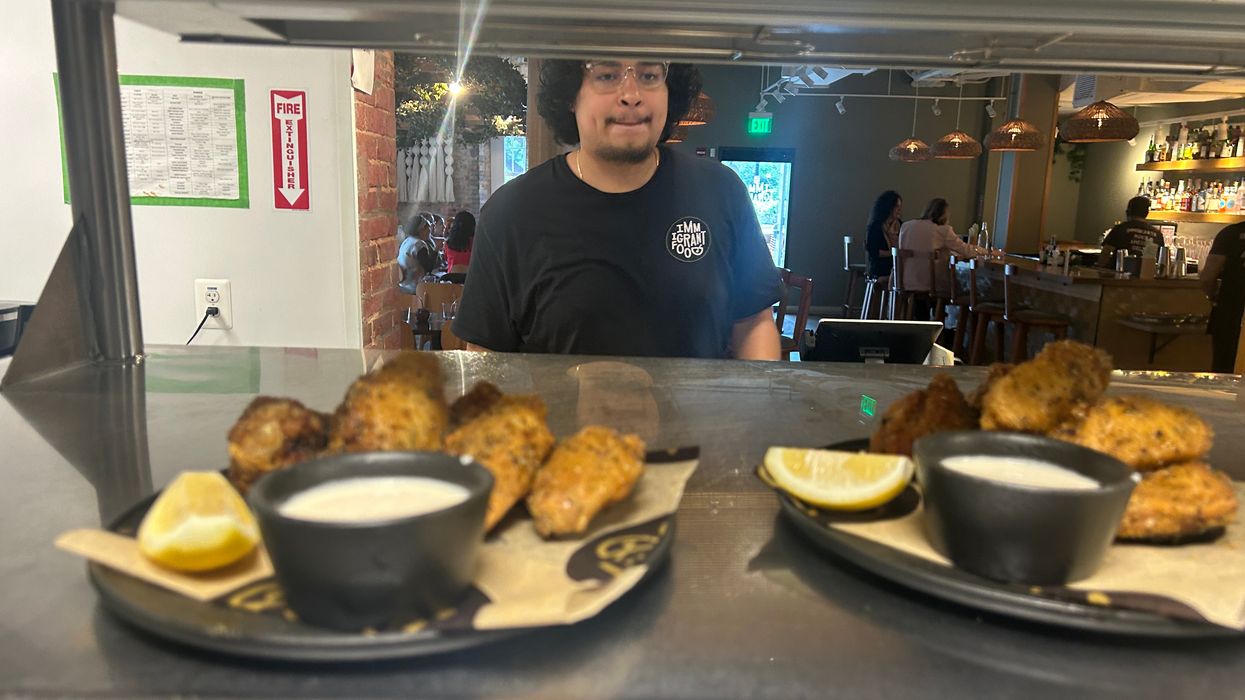WASHINGTON — A five-minute walk from the White House, across the street, sits a restaurant with a curious name: Immigrant Food.
The restaurant brands itself as a hub for “gastroadvocacy,” a blend of gastronomy and immigrant advocacy, weaving social justice into the dining experience. From Venezuelan tequeños to West African gumbo to coconut curry chicken, Immigrant Food’s menu reflects the diverse culinary traditions immigrants bring to the United States. And every plate tells a story.
“Immigrant Food has two beating hearts. The first beating heart is the heart that a lot of restaurants have, which is the gastronomy and the culinary experience,” co-founder Peter Schecter said. “But we have a second beating heart – a mission to advocate, educate, and celebrate immigrants, what they've brought to the United States, who they are, what they mean to the United States, and how they're part of the American DNA.”
A lively lunch spot with globally inspired dishes, Immigrant Food presents a stylish addition to D.C.’s booming restaurant scene. But the restaurant carries a mission that sets it apart.
The idea came from Schechter, a longtime political strategist. After years of working in Washington’s policy circles, Schechter said he wanted to build a space that reminded people of the human side of immigration. Food could be the perfect vehicle.
The first location opened in November 2019, the same day the Supreme Court heard arguments on the immigration policy Deferred Action for Childhood Arrivals (DACA) program. Now, with three locations in D.C. and one in Arlington, Virginia, the popular, mission-driven food spot offers interactive features to enhance the customer experience.
“For example, we present checks in a, not real but pretty close to real, American passport. And then people can write what they think of the restaurant, in the passport,” Schecter said.
An immigrant himself, Schecter was born in Italy to Austrian and German parents.
“They moved to Rome, the most romantic city in the world. … I grew up speaking only Italian,” he said. His parents were refugees of World War II, eventually resettling in the U.S. After a decade-long stint in Latin America, Schecter relocated to the U.S., too.
The restaurant’s other co-founder, Teá Ivanovic, emigrated from Belgium as the daughter of Yugoslav parents, and the executive chef, Benjamin Murray, was born in Japan.
Their stories are quintessential of immigrants seeking the American dream.
“We Americans don't believe in that American dream anymore. … That sort of dream is lost on a lot of Americans. But there's one group of people that still believe, and they're immigrants,” Schecter said. “They come here, they work hard. They raise their families. They play by the rules, and their children become Americans just like you.”
All staff members wear black T-shirts with white lettering that reads, “Immigrants make America great.” Menus feature QR codes that can be scanned for a list of engagement opportunities, including marches and petitions. And drink coasters pose immigrant-related questions on the back for customers to ponder as they await their food.
“True or false? Today, the percentage of immigrants in America is much larger than in 1870,” one coaster reads.
The answer is false. Immigrants currently comprise 14.3% of the U.S. population, according to the Pew Research Center, which translates to approximately 47.8 million people. In 1870, the percentage was 14.4%, according to the Migration Policy Institute. The record high was in 1890 at 14.8%.
Immigrant Food’s location underscores a striking contrast: a pro-immigrant business, just a block away from the highest office, where a new presidential administration has taken a hard-line stance on illegal immigration.
Many restaurants, hotels, farms, and other businesses rely, in part, on employees without legal documentation. In 2022, more than 30 million immigrants made up the U.S. workforce, and of those, 8.3 million were unauthorized to work in the U.S., according to the Pew Research Center’s latest figures.
“At this time of deep division, we all wake up every morning wondering what we can do to act, help, and change things. We’ve decided to engage in the fight against a new intolerance in America,” Immigrant Food’s website says. “Restaurants have always been the place where immigrants made a living, created community, and showed off the cooking of their heritage. We’re taking it a step further and also making this restaurant a place to advocate.”
The “gastroadvocacy” mission extends beyond the kitchen and dining room. Each month, Immigrant Food partners with local nonprofits that provide legal aid, refugee resettlement, and community support, offering customers a direct line to advocacy opportunities.
Against a backdrop of a contentious immigration climate in the nation’s capital, Immigrant Food positions itself as a softer entry point into tough conversations.
“The restaurant is a safe space to talk about difficult policy,” Schecter said.
Ashley N. Soriano is a graduate student at Northwestern University Medill School of Journalism in the Politics, Policy, and Foreign Affairs specialization.
The Fulcrum is committed to nurturing the next generation of journalists. To learn about the many NextGen initiatives we are leading, click HERE.




















Trump & Hegseth gave Mark Kelly a huge 2028 gift